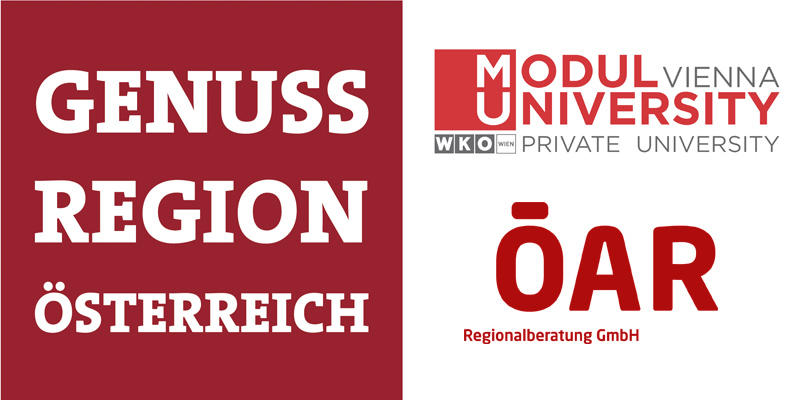Evaluation of culinary initiatives for rural development in Austria
July 17, 2015
In spring 2014, MODUL University Vienna, together with ÖAR Regionalberatung (regional consulting), was commissioned by the Austrian Federal Ministry of Agriculture, Forestry, Environment and Water Management (BMLFUW) to deliver an overview of the most relevant ‘Ländliche Entwicklung’ (rural development) initiatives related to culinary and regional products. The review of projects co-funded by EU monetary funds focused particularly on the example of the ‘Genuss Region Österreich (GRÖ)’ initiative. GRÖ has been promoting regional food and beverage products from more than 100 regions in Austria for more than 8 years.
MU’s Sabine Sedlacek, Verena Peer, and Andreas Zins were on the team of researchers who performed an in-depth analysis of the impacts and added value of the project in order to clarify the benefits for the various regions, actors, and the funding authority. Through the analysis, they were able to identify success factors and made recommendations for further development for the upcoming program period LE2020. Some of the key findings:
Genuss Region Österreich (GRÖ) has defined and been following nine dimensions where contributions and progress should be achieved over the years:
1. Positioning of Austria as “the GenussRegion” in middle Europe.
2. Qualitative development of the GenussRegions
3. Increase of density of offers in the regions: e.g. farm outlet shops, craftsmen, workshops, gastronomy, tourism, retailers
4. Increase of market share of the GRÖ products within the regions
5. Focused training services for GRÖ teams and their partners in the regions
6. Visibility of the GRÖ products outside the GRÖ regions
7. Integration of the GRÖ products into the tourism offer of Austria
8. Increase in coverage of GRÖ culinary products in the gastronomy sector
9. GRÖ as a pillar for a sustainable income and job preservation within the regions
Six of these nine goals of the GRÖ initiative could be quantified from perceptions revealed by the actors (mainly producers and company owners) in the GRÖ regions (see figure below). For each goal dimension indices were calculated and transformed into comparable scales with 100% representing a maximum of achievements evaluated by the respective actors. The best results were attested with respect to an increase of attractiveness for tourism. The least progress was identified in terms of income and job preservation.

The activities of the GRÖ initiative yielded an estimated direct added value of annually 4 to 6.5 mil. € within the agricultural, the gastronomy and hotel and the retail sector. The initial financial support from public funds (between 2007 and 2013: from LEADER funds M313 and M331 and public relation support) amounts to 25.4 mil. €. This external support triggered a direct add value of about 37 mil. € in the above mentioned sectors plus the sub-sector called services for companies. Considering direct and indirect effects, the added value was estimated at about 49 mil. €.
The complete report (in German) can be retrieved from the BMLFUW website: www.bmlfuw.gv.at/land/laendl_entwicklung/le-07-13/evaluierung/le_studien/Kulinarikinitiativen.htm





